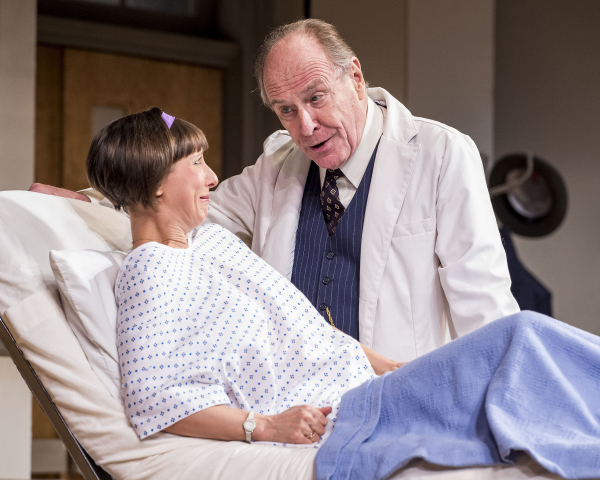What the Butler Saw
The classic Joe Orton farce turns audiences at the Mark Taper Forum into voyeurs.

(© Craig Schwartz)
Joe Orton's What the Butler Saw has been shocking audiences since 1969. It deals openly with homosexuality, incest, insanity, and government incompetence — and contains male nudity. It takes the conventions of the genre and blows them up. While most farce is frivolous, Orton's is subversive — not merely fast-paced, but anarchic. Morality standards have evolved since the play first opened, but as evidenced by the production at the Mark Taper Forum, this hilarious comedy has lost no steam.
The horny psychiatrist Dr. Prentice (Charles Shaughnessy) cons his young secretarial candidate Ms. Barclay (Sarah Manton) into an "intimate" examination on his couch. Interrupted by his soused wife (Frances Barber), he hides and lies about the naked girl behind the curtain. Meanwhile, the doctor's missus interrupts her husband's "examination" complaining that she had her own sexual shame in the form of suggestive photos taken by Nicholas Beckett (Angus McEwan), a hotel bellhop, when he attacked her the previous night in a linen closet. The deceit is punished by the most dangerous of men, Dr. Rance (Paxton Whitehead), a windbag consulting psychiatrist who doesn't listen to his patients and reacts based on his unyielding preconceived notions. Police Sergeant Match (Rod McLachlan), another useless authority, winds up getting stripped, stabbed, and chased around in a dress.
The cast is game for anything, and in this show, anything is required. Orton's dialogue is filled with inane double-speak and tongue-twisting alliterations, which the cast is highly adept at delivering. Whitehead, who early in his career played Freddy in the original Broadway cast of Noises Off, is a perfect actor for farce. Whitehead is hysterical as Dr. Rance, acting easily flustered, because the character is genuinely inept yet encased in a shield of moral superiority. Even when his character pontificates with pointless dribble, Whitehead sells it like he is delivering the Sermon on the Mount.
Dr. Prentice, an amoral sexual sociopath, spouts fib after fib and allows an innocent girl to have her hair shorn, then be shot up with meds and locked in a padded cell just so he can get away with a little nookie. Shaughnessy brings British noble charm to the role. His character is lecherous and hateful, but in Shaughnessy's hands, the character almost appears dignified. West End star Barber has the difficult task of remaining inebriated, constantly flummoxed, and on the verge of a nervous breakdown, while not being too broad or exasperating. She finds all the perfect notes so that audiences pity her for being married to a sociopath, but also pity him for being stuck with a cold harpy. As the two younger pawns, Manton and McEwan allow their bodies to be exploited and to endure pain for entertainment value. McLachlan gets the most punishment in this physical play, and he portrays a character too blinded by the law to waste any thoughts on logic.
Orton's lines still sting today. He runs roughshod over British sensibilities of the time and makes brash fun of lascivious plot points that in a different tone could be mistaken for an episode of Law and Order: SVU. Farce is the convention he uses to destroy those he deems hypocrites of British morality. Like many successful farces, multiple doors open and close, people lose their clothing, coincidence ties the characters together, and actors run around the stage more than mice in a cage. Director John Tillinger keeps the fast pace so some of the more preposterous plot points do not have time to simmer. Orton does not want his audience to contemplate; he wants them to be overwhelmed. To accompany such shenanigans, James Noone's set offers a sterile office and plenty of doors to run though. Laurie Churba Kohn's costumes and Carol Doran's hairstyles set the mood of mod 1960s England.
It is often said that drama can be the most blistering of the human condition, the most reflective. Orton and his maniacal play, like many black comedies, proves that even the zaniest of works, wrapped in a frivolous convention, can be just as incisive a mirror to society's damaged soul.









